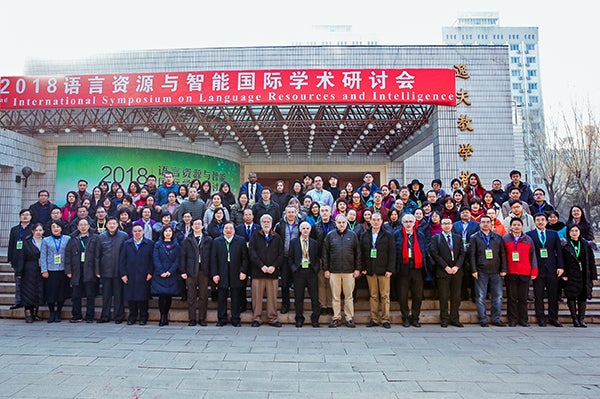The 2nd International Symposium on Language Resources and Intelligence
The 2nd International Symposium on Language Resources and Intelligence, co-organized by LDC and Beijing Language and Culture University, took place December 16-17, 2018 in Beijing, China. Topics included low resource languages, the Belt and Road Initiative, developing resources for artificial intelligence applications, Chinese dialects, speech processing and clinical applications of human language technology. This was the second in a series of LDC workshop collaborations supported by the Penn China Research and Engagement Fund.

Day One Presentations, December 16, 8:30-18:30
Location: Beijing Language and Culture University
The Concept and Practice for Protecting Language Resources of China
Li Yuming, Beijing Language and Culture University
Available: Slides in PDF
Language resources, intelligence, and community
Mark Liberman, Linguistic Data Consortium / University of Pennsylvania
Available: Slides in PDF
Protection of the Cross-border Language Resources of China
Huang Xing, Institute of Ethnology and Anthropology, Chinese Academy of Social Sciences
Available: Slides in PDF
Protection of Chinese Minority Language Resources: Data and Status Quo
Ding Shiqing, Research Center for the Protection of Minority Language Resources / Minzu University
Saving World Languages Using Logograms
Daniel Glon, Expert Group for the Olympic Winter Games Term Portal Program
Available: Slides in PDF
Learning Resources for Chinese Language teaching as a discipline
Joël Bellassen, INALCO
Available: Slides in PDF
Creation of Language Packs for Low Resource Languages
Zhiyi Song, Linguistic Data Consortium
Available: Slides in PDF
Corpus Methods in a Digitized World
Kenneth Church, Baidu Research
Available: Slides in PDF
A Preliminary Review and Analysis of the Linguistics-related Curriculum from the Computational Perspective
Sun Maosong, Tsinghua University
Available: Slides in PDF
Language Situation and Language Policies of the "Belt and Road" Countries: Reflections in the New Era
Wang Hui, College of International Culture and Communication
Research and Development of Language Resources for Artificial Intelligence: Theory and Methods
Xun Endong, Beijing Language and Culture University
Panel Discussion
Talents Cultivation on Language Resources and Intelligence
Chu-Ren Huang, Sun Maosong, Jiahong Yuan, Liu Heping, Xun Endong, Hu Renfen
Day Two Presentations, December 17, 2018: 8:30-18:00
Location: Penn Wharton China Center, Beijing
Presentations
NIEUW: Infrastructure for Eliciting Language and Linguistic Judgments in Multiple Languages and Situations
Christopher Cieri, Linguistic Data Consortium
Classification of Chinese dialect regions from L2 English speech
Jiahong Yuan, Linguistic Data Consortium / LAIX Inc.
Speech Processing in Realistic Environments: From Speaker Diarization to Speech Recognition
Jun Du, University of Science and Technology of China
Available: Slides in PDF
Probability distribution of syntactic divergences of determiner his-(adjective)-noun structure in English-to-Chinese Translation
Yue Jiang, Xi'an Jiaotong University
Perception and production of English lexical stress by Uyhgur and Tibetan speakers
Hui Feng, Tianjin University
Chasing the Unexplained Variance
Kenneth Church, Baidu Research
Development and Distribution of Clinical Speech and Language Datasets
Denise DiPersio, Linguistic Data Consortium
Available: Slides in PDF
Clinical Applications of Human Language Technology
Mark Liberman, Linguistic Data Consortium / University of Pennsylvania
Available: Slides in PDF
Construction of Linguistic Resources for Mental Disorders - Interdisciplinary Research in Linguistics, Cognitive Neuroscience and Artificial Intelligence
Hongwei Ding, Shanghai Jiao Tong University
Available: Slides in PDF
Language Biomarkers of Brain Health
Rhoda Au, Neuropsychology Division, Framingham Heart Study
Available: Slides in PDF
Three applications of NLP: Drug intoxication, Schizophrenia, and Alzheimer's Disease
Elif Eyigoz, IBM Thomas J. Watson Research Center
Available: Slides in PDF
Deep learning approach to automatic detection of language impairment in spontaneous speech
Tan Lee, The Chinese University of Hong Kong
Available: Slides in PDF
The Curing Terms: From Medical Terminology to Causal Relations
Xiaowen Wang, Guangdong University of Foreign Studies
Natalia Klyueva, Emmanuele Chersoni, Chu-Ren Huang, The Hong Kong Polytechnic University
Available: Slides in PDF